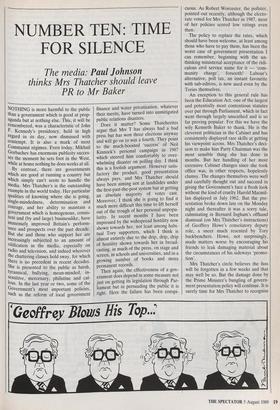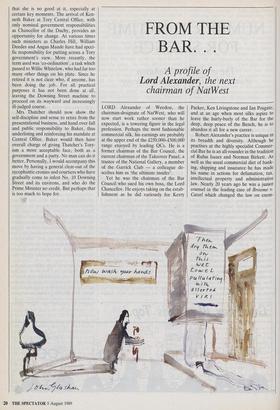NUMBER TEN: TIME FOR SILENCE
The media: Paul Johnson
thinks Mrs Thatcher should leave
PR to Mr Baker
NOTHING is more harmful to the public than a government which is good at prop- aganda but at nothing else. This, it will be remembered, was a characteristic of John F. Kennedy's presidency, held in high regard in its day, now dismissed with Contempt. It is also a mark of most Communist regimes. Even today, Mikhail Gorbachev has enormous publicity succes- ses the moment he sets foot in the West, while at home nothing he does works at all. By contrast, there are governments which are good at running a country but which simply can't seem to handle the media. Mrs Thatcher's is the outstanding example in the world today. Her particular qualities of knowing where she is going, single-mindedness, determination and courage, and her ability to maintain a goverment which is homogenous, consis- tent and (by and large) businesslike, have Immensely improved Britain's perform- ance and prospects over the past decade. But she and those who support her are increasingly subjected to an amount of vilification in the media, especially on radio and television, and indeed wherever the chattering classes hold sway, for which there is no precedent in recent decades. She is presented to the public as harsh, tyrannical, bullying, mean-minded, in- sensitive, mercenary, philistine and cal- lous. In the last year or two, some of the Government's most important policies, such as the reform of local government finance and water privatisation, whatever their merits, have turned into unmitigated public relations disasters. Does it matter? Some Thatcherites argue that Mrs T has always had a bad press but has won three elections anyway and will go on to win a fourth. They point to the much-boosted 'success' of Neil Kinnock's personal campaign in 1987 which steered him comfortably to over- whelming disaster on polling day. I think this is a foolish argument. However satis- factory the product, good presentation always pays, and Mrs Thatcher should have been aiming not at landslides under the first-past-the-post system but at getting an absolute majority of votes cast. Moreover, I think she is going to find it much more difficult this time to lift herself out of the trough of her personal unpopu- larity. In recent months I have been impressed by the widespread hostility now shown towards her, not least among habi- tual Tory supporters, which I think is almost entirely due to the drip, drip, drip of hostility shown towards her in broad- casting, in much of the press, on stage and screen, in schools and universities, and in a growing number of books and more permanent records.
Then again, the effectiveness of a gov- ernment does depend in some measure not just on getting its legislation through Par- liament but in persuading the public it is right. Here the failure has been conspi-
cuous. As Robert Worcester, the pollster, pointed out recently, although the electo- rate voted for Mrs Thatcher in 1987, most of her policies scored low ratings even then.
The policy to replace the rates, which should have been welcome, at least among those who have to pay them, has been the worst case of government presentation I can remember, beginning with the un- thinking ministerial acceptance of the ridi- culous civil service name for it — 'com- munity charge', forsooth! Labour's alternative, poll tax, an instant favourite with sub-editors, is now used even by the Tories themselves.
An exception to this general rule has been the Education Act, one of the largest and potentially most contentious statutes ever put through Parliament, which in fact went through largely unscathed and is so far proving popular. For this we have the wily Kenneth Baker to thank. He is the cleverest politician in the Cabinet and has consistently displayed rare skills at getting his viewpoint across. Mrs Thatcher's deci- sion to make him Party Chairman was the most sensible thing she has done in months. But her handling of her most extensive Cabinet changes since she took office was, in other respects, hopelessly clumsy. The changes themselves were well and carefully thought out and succeed in giving the Government's face a fresh look without the kind of cruelty Harold Macmil- lan displayed in July 1962. But the pre- sentation broke down late on the Monday night and thereafter it was a sorry tale, culminating in Bernard Ingham's offhand dismissal (on Mrs Thatcher's instructions) of Geoffrey Howe's consolatory deputy role, a sneer much resented by Tory backbenchers. Howe, not surprisingly, made matters worse by encouraging his friends to leak damaging material about the circumstances of his sideways 'promo- tion'.
Mrs Thatcher's circle believes the fuss will be forgotten in a few weeks and that may well be so. But the damage done by the Prime Minister's bungling of govern- ment presentation policy will continue. It is surely time for Mrs Thatcher to recognise that she is no good at it, especially at certain key moments. The arrival of Ken- neth Baker at Tory Central Office, with only nominal government responsibilities as Chancellor of the Duchy, provides an opportunity for change. At various times such ministers as Charles Hill, William Deedes and Angus Maude have had speci- fic responsibility for putting across a Tory government's view. More recently, the term used was 'co-ordination', a task which passed to Willie Whitelaw, who had far too many other things on his plate. Since he retired it is not clear who, if anyone, has been doing the job. For all practical purposes it has not been done at all, leaving the Downing Street machine to proceed on its wayward and increasingly ill-judged course.
Mrs Thatcher should now show the self-discipline and sense to retire from the presentational business, and hand over full and public responsibility to Baker, thus underlining and reinforcing his mandate at Central Office. Baker would then have overall charge of giving Thatcher's Tory- ism a more acceptable face, both as a government and a party. No man can do it better. Personally, I would accompany this move by having a general clear-out of the sycophantic cronies and courtiers who have gradually come to infest No. 10 Downing Street and its environs, and who do the Prime Minister no credit. But perhaps that is too much to hope for.



















































 Previous page
Previous page